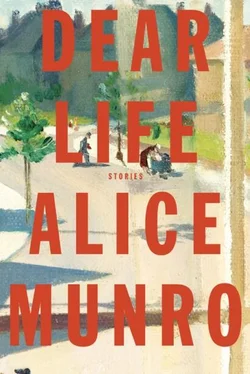The most unusual thing about Sadie—though it was not a thing stressed in our house—was that she was a celebrity. Our town had a radio station where she played her guitar and sang the opening welcome song which was her own composition.
“Hello, hello, hello, everybody—”
And half an hour later it was, “Good-bye, good-bye, good-bye, everybody.” In between she sang songs that were requested, as well as some she picked out herself. The more sophisticated people in town tended to joke about her songs and about the whole station which was said to be the smallest one in Canada. Those people listened to a Toronto station that broadcast popular songs of the day—three little fishes and a momma fishy too—and Jim Hunter hollering out the desperate war news. But people on the farms liked the local station and the kind of songs Sadie sang. Her voice was strong and sad and she sang about loneliness and grief.
Leanin’ on the old top rail,
in a big corral.
Lookin’ down the twilight trail
For my long lost pal—
Most of the farms in our part of the country had been cleared and settled around a hundred and fifty years ago, and you could look out from almost any farmhouse and see another farmhouse only a few fields away. Yet the songs the farmers wanted were all about lone cowhands, the lure and disappointment of far-off places, the bitter crimes that led to criminals dying with their mothers’ names on their lips, or God’s.
This was what Sadie sang with such sorrow in a full-throated alto, but in her job with us she was full of energy and confidence, happy to talk and mostly to talk about herself. There was usually nobody to talk to but me. Her jobs and my mother’s kept them divided most of the time and somehow I don’t think they would have enjoyed talking together anyway. My mother was a serious person as I have indicated, one who used to teach school before she taught me. She maybe would have liked Sadie to be somebody she could help, teaching her not to say “youse.” But Sadie did not give much indication that she wanted the help anybody could offer, or to speak in any way that was different from how she had always spoken.
After dinner, which was the noon meal, Sadie and I were alone in the kitchen. My mother took time off for a nap and if she was lucky the babies napped too. When she got up she put on a different sort of dress as if she expected a leisurely afternoon, even though there would certainly be more diapers to change and also some of that unseemly business that I tried never to catch sight of, when the littlest one guzzled at a breast.
My father took a nap too—maybe fifteen minutes on the porch with the Saturday Evening Post over his face, before he went back to the barn.
Sadie heated water on the stove and washed the dishes with me helping and the blinds down to keep out the heat. When we were finished she mopped the floor and I dried it, by a method I had invented—skating around and around it on rags. Then we took down the coils of sticky yellow flypaper that had been put up after breakfast and were already heavy with dead or buzzing nearly dead black flies, and hung up the fresh coils which would be full of newly dead ones by suppertime. All this while Sadie was telling me about her life.
I didn’t make easy judgments about ages then. People were either children or grown-ups and I thought her a grown-up. Maybe she was sixteen, maybe eighteen or twenty. Whatever her age, she announced more than once that she was not in any hurry to get married.
She went to dances every weekend but she went by herself. By herself and for herself, she said.
She told me about the dance halls. There was one in town, off the main street, where the curling rink was in the winter. You paid a dime for a dance, then went up and danced on a platform with people gawking all around, not that she cared. She always liked to pay her own dime, not to be beholden. But sometimes a fellow got to her first. He asked if she wanted to dance and the first thing she said was, Can you? Can you dance? she asked him bluntly. Then he would look at her funny and say yes, meaning why else would he be here? And it would turn out usually that what he meant by dance was shuffling around on two feet with his sweaty big meats of hands grabbing at her. Sometimes she just broke off and left him stranded, danced by herself—which was what she liked to do anyway. She finished up the dance that had been paid for, and if the money-taker objected and tried to make her pay for two when it was only one, she told him that was enough out of him. They could all laugh at her dancing by herself if they liked.
The other dance hall was just out of town on the highway. You paid at the door there and it wasn’t for one dance but the whole night. The place was called the Royal-T. She paid her own way there too. There was generally a better class of dancer, but she did try to get an idea of how they managed before she let them take her out on the floor. They were usually town fellows while the ones at the other place were country. Better on their feet—the town ones—but it was not always the feet you had to look out for. It was where they wanted to get hold of you. Sometimes she had to read them the riot act and tell them what she would do to them if they didn’t quit it. She let them know she’d come there to dance and paid her own way to do it. Furthermore she knew where to jab them. That would straighten them out. Sometimes they were good dancers and she got to enjoy herself. Then when they played the last dance she bolted for home.
She wasn’t like some, she said. She didn’t mean to get caught.
Caught. When she said that, I saw a big wire net coming down, some evil little creatures wrapping it around and around you and choking you so you could never get out. Sadie must have seen something like this on my face because she said not to be scared.
“There’s nothing in this world to be scared of, just look out for yourself.”
“You and Sadie talk together a lot,” my mother said.
I knew something was coming that I should watch for but I didn’t know what.
“You like her, don’t you?”
I said yes.
“Well of course you do. I do too.”
I hoped that was going to be all and for a moment I thought it was.
Then, “You and I don’t get so much time now we have the babies. They don’t give us much time, do they?
“But we do love them, don’t we?”
Quickly I said yes.
She said, “Truly?”
She wasn’t going to stop till I said truly, so I said it.
* * *
My mother wanted something very badly. Was it nice friends? Women who played bridge and had husbands who went to work in suits with vests? Not quite, and no hope of that anyway. Was it me as I used to be, with my sausage curls that I didn’t mind standing still for, and my expert Sunday School recitations? No time for her to manage that anymore. And something in me was turning traitorous, though she didn’t know why, and I didn’t know why either. I hadn’t made any town friends at Sunday School. Instead, I worshipped Sadie. I heard my mother say that to my father. “She worships Sadie.”
My father said Sadie was a godsend. What did that mean? He sounded cheerful. Maybe it meant he wasn’t going to take anybody’s side.
“I wish we had proper sidewalks for her,” my mother said. “Maybe if we had proper sidewalks she could learn to roller-skate and make friends.”
I did wish for roller skates. But now without any idea why, I knew that I was never going to admit it.
Then my mother said something about it being better when school started. Something about me being better or something concerning Sadie that would be better. I didn’t want to hear.
Sadie was teaching me some of her songs and I knew I wasn’t very good at singing. I hoped that wasn’t what had to get better or else stop. I truly did not want it to stop.
Читать дальше












